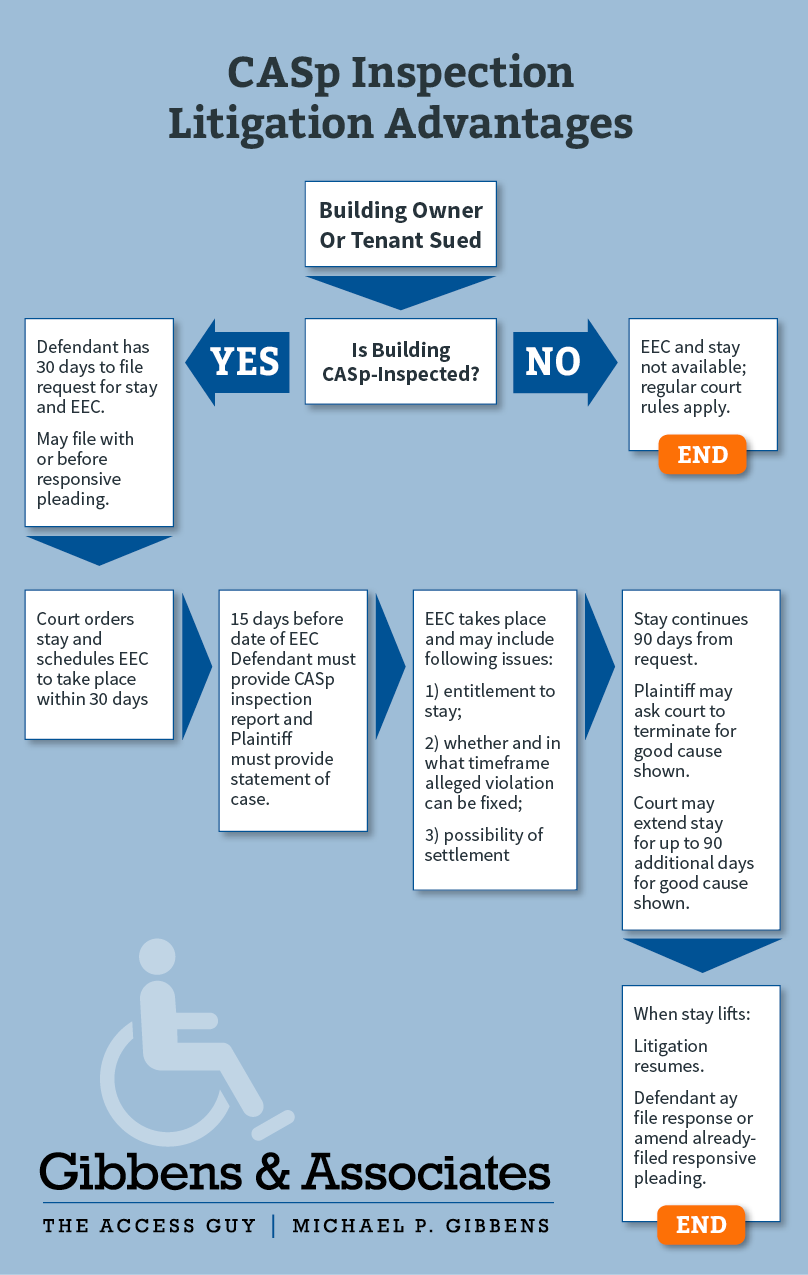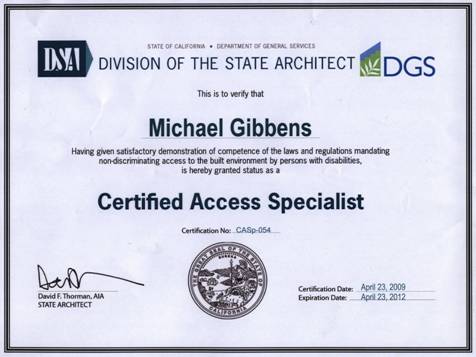SB 1608:
Disability Access Law Reform
How does it help Business Owners?
Ensuring Compliance
- How can business owners ensure compliance and reduce chances of getting sued? One of the best ways to avoid being sued under the disability access laws is to ensure that buildings are in compliance in California, SB 1608 provides a number of ways to help business owners.
- Businesses should hire a CASp. A certified access specialist (CASp) is a person business owners can be assured has been tested and certified by the state as an expert in disability access laws. SB 1608 sets up a process whereby business owners can voluntarily hire a CASp to inspect their buildings to ensure compliance with disability access standards and obtain an inspection report as proof they did so.
Businesses should begin the process of obtaining an inspection as soon as possible.
- Either building owners or tenants can order a CASp inspection.
(Either can be sued for non-compliance.) If you are a tenant, you may want to discuss with the building owner whether a CASp inspection was already completed or if there are plans for one. - Businesses should ensure when they hire a CASp that the CASp provides an inspection report detailing what was inspected.
SB 1608 requires the CASp to notify you of the right to an inspection report. Without one, business owners will not have proof of the inspection. - If the CASp determines that corrections are needed in order for the site to be approved, the business owner is entitled to a written report identifying changes that need to be made and recommended reasonable timeframes for fixes.
- Business owners should keep the inspection report confidential and in a safe place.
If you are ever sued, you must have a CASp inspection report in order to be eligible to request a 90-day stay of the lawsuit and an Early Evaluation Conference (more about this on the next page). If you do not have a report, you will be barred from this benefit. - Businesses should request and post a CASp window sign.
Businesses whose structures have been approved by CASps will be able to request a window sign signifying they have been CASp-inspected. The window sign will send the message that the business has taken proactive steps to comply with the disability access laws and is not an easy target for lawyers seeking to earn quick money. - Improved expertise in new construction and building inspections.
For the first time, there will be minimum continuing education requirements for building inspectors and architects on disability access laws, to help reduce the problem of new construction failing to comply. Moreover, by July 2010, local building inspection offices will be required to have at least one CASp on staff, available to provide consultation. Eventually all permitting and plan checks must be CASp-inspected. - New state disability access commission part of the solution.
SB 1608 created a new California Commission on Disability Access (CCDA), which will be a 17-member state advisory commission made up of legislative and gubernatorial appointees from both the disability and business communities. The commission will be assigned the task of evaluating and providing recommendations on further disability access issues having an impact on the disability and business communities.
Resolving Lawsuits Early
- If a business owner does get sued, how does SB 1608 help to encourage early resolution of the lawsuit?
Even when businesses have reduced their chances of a lawsuit by hiring a CASp to ensure their building is in compliance and posting their CASp sign, unfortunately, there is never a 100 percent guarantee of not getting sued. However, SB 1608 gives CASp-approved businesses some tools for helping to resolve unnecessary litigation and encouraging early resolution. - 90-day stay of the lawsuit and early evaluation conference.
Businesses that have been CASp-inspected before being sued — and only those businesses — are entitled to request a 90-day stay of the lawsuit and an Early Evaluation Conference (EEC). - A stay is a temporary halting of all litigation.
A major benefit of halting litigation temporarily is that attorneys will not be able to engage in motions or discovery and other activities that incur expensive attorneys’ fees. - The EEC is a court-run conference between the parties, at which the parties will have the opportunity to explore whether the lawsuit can be settled.
For example, if the lawsuit is based on an alleged violation that would be easy for the business to fix, and the business is willing to resolve the issue quickly, the parties will be able to discuss whether further litigation is necessary. - How to request the stay and EEC.
A defendant must file a request form with the court within 30 days of being sued. The appropriate form is required to be delivered with the lawsuit, but all necessary forms and instructions also will be made available on the state’s court self-help website later this year. The court will grant the stay and EEC upon receipt of the request and schedule a time for the conference, within 50 days from the filing of the request. The plaintiff and defendant will be directed to appear in person at the time of the conference. - Defendant must provide the CASp inspection report.
No later than 15 days before the EEC, the defendant absolutely must file with the court and provide the plaintiff with a copy of the CASp inspection report. If the defendant does not do so, the court may lift the stay absent a showing of good cause. The confidentiality of the report must be maintained until the conclusion of the lawsuit.
Reducing Unwarranted Lawsuits
- What elements of SB 1608 help to reduce unwarranted ADA lawsuit practices?
SB 1608 also established important reforms that will help to reduce inappropriate attorney monetary demands and provide significant clarifications in the law for both plaintiffs and defendants concerning recoverable damages and settlement offers: - Attorneys who issue demands for money must also provide the business owner with an advisory statement.
SB 1608 requires that written demands for money by attorneys be accompanied by an explanation of the legal rights of the building owner/tenant, including the ability to contact their insurance company as well as an attorney experienced with ADA lawsuits. In addition, the advisory will explain that receipt of a demand for money does not necessarily mean the business is liable. Attorneys who fail to comply may be reported to the State Bar. The advisory statement will be available in multiple languages on the state court website. - Multiple damages may not be recovered at a single facility.
SB 1608 will help to ensure that damages may be claimed only when a plaintiff personally encountered a violation or was deterred from gaining access on a particular occasion. SB 1608 clarifies that a denial of full and equal access constitutes one violation per distinct facility for purposes of damages. Damages may not be recovered for each and every single offense that may exist at the particular facility. In addition, the plaintiff may not recover for violations that may have existed at a facility but which never caused harm or injury to the plaintiff, either in the form of an encounter or deterrence on a particular occasion.
Parties will be encouraged to consider reasonable settlement offers.
- SB 1608 clarifies that a court can consider, among other relevant factors, reasonable written settlement offers made and rejected by either party in determining the amount of an attorneys’ fees award at the conclusion of a case.
Reproduced with permission from the California Chamber of Commerce, which provides more information at www.calchamber.com/ada


